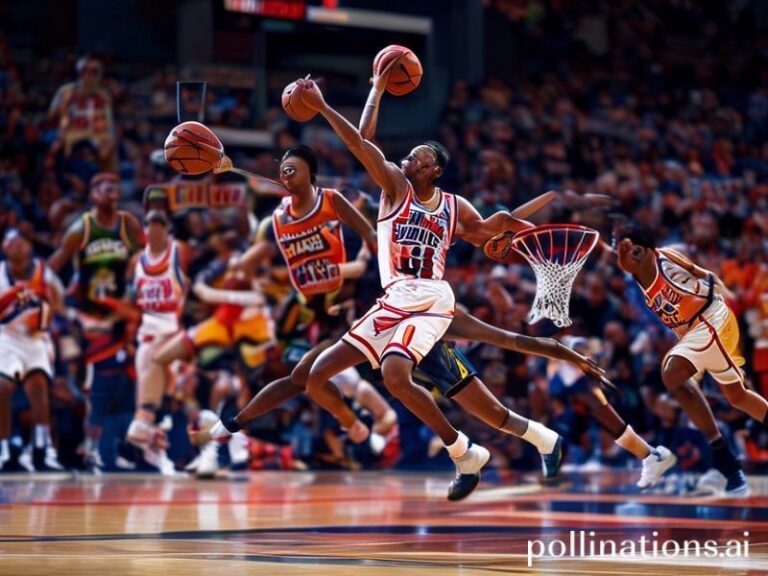Alanna Smith vs. the Entire Planet: One Bowler, One Lawsuit, and the Slow Implosion of Global Sport
Alanna Smith and the Quiet Collapse of the Global Order
Dave’s Locker – International Bureau
In any other decade, a 29-year-old Australian swing bowler with a respectable but not-quite-Bradmanesque record would merit little more than a polite ripple in the sports pages. Yet Alanna Smith—currently pacing her run-up for the Birmingham Phoenix in the Hundred while simultaneously suing her own national board—has become a walking allegory for the late-capitalist moment: equal parts talent, litigation, and existential dread.
Smith’s case lands at a curious intersection of sport, labor law, and the slow-motion car crash we politely call “global governance.” Cricket Australia, still hung-over from the 2018 sandpaper fiasco and now hemorrhaging broadcast cash faster than a crypto exchange, recently offered its centrally contracted women a 25 % raise. Magnificent—until you notice the men’s team got 80 %, the board members got bonuses, and inflation in Sydney is doing its best impression of Weimar Lite. Smith, refusing to accept the crumb-distribution model, filed a federal complaint alleging systemic gender discrimination. In doing so she has dragged the entire ICC—an organization whose idea of progressive reform is adding a third ad break—into the unflattering glow of international scrutiny.
From Mumbai boardrooms to London pubs, the reaction has been predictable. Indian Premier League owners, who recently paid more for a 30-second selfie with Virat Kohli than Smith will earn in a lifetime, have responded with the corporate version of a shrug emoji. The ECB, terrified that its shiny new women’s Hundred might resemble actual labor unrest, released a statement praising “courageous conversations” while quietly renewing Sky’s broadcast deal in a side room guarded by ex-MI6 types. Meanwhile, the West Indies players’ association sent Smith a crate of rum and a WhatsApp voice note that simply said, “Welcome to the club, mate.”
The broader significance? Smith is a canary in a coal mine we’ve all agreed to keep digging. Around the planet, broadcast rights for women’s sports are exploding—up 1,800 % in parts of Asia—yet the athletes themselves still discover their bathroom breaks are sponsored by a crypto rug-pull. The WNBA sells “equity” to Mark Cuban while its stars fly commercial next to a guy eating canned tuna. Nike tweets “Dream Crazier” from an account run by an unpaid intern. Somewhere in Lausanne, an IOC apparatchik adds another zero to his per-diem and calls it progress.
And still Smith runs in, day after humid English day, trying to land off-cutters on a five-inch patch of green that may or may not exist by 2035. Climate change, that other undefeated opponent, is already truncating seasons: Sri Lanka just abandoned a match at 42 °C, and the Bangladesh Premier League now schedules twilight fixtures so players can avoid both heatstroke and dengue. Smith’s legal brief might be the first filed in both Fair Work Australia and the Anthropocene.
Of course, the suits will settle. They always do—quietly, with an NDA and a motivational speaking slot at next year’s “Women in Leadership” brunch. Smith will probably get her back pay, the ICC will commission a diversity report written by the same consultancy that advised BP on going green, and everyone will agree that the system works because one person managed to beat it.
Yet in Lagos, where girls still bowl with taped tennis balls on concrete strips, Smith’s name is being scribbled inside notebook covers. In Kabul, where the Taliban banned women from stadiums but not from rooftops with shortwave radios, someone just learned the word “parity.” And somewhere in Melbourne, a 12-year-old fast bowler is Googling “class action lawsuit” between math homework and net practice.
That, in the end, is Alanna Smith’s global impact: proof that the empire can still be embarrassed by a woman with a 78 mph inswinger and a stubborn belief that spreadsheets are not destiny. Whether the empire listens is another matter entirely. History suggests it will simply change the font on the press release and hope we’re all too busy doom-scrolling to notice.







